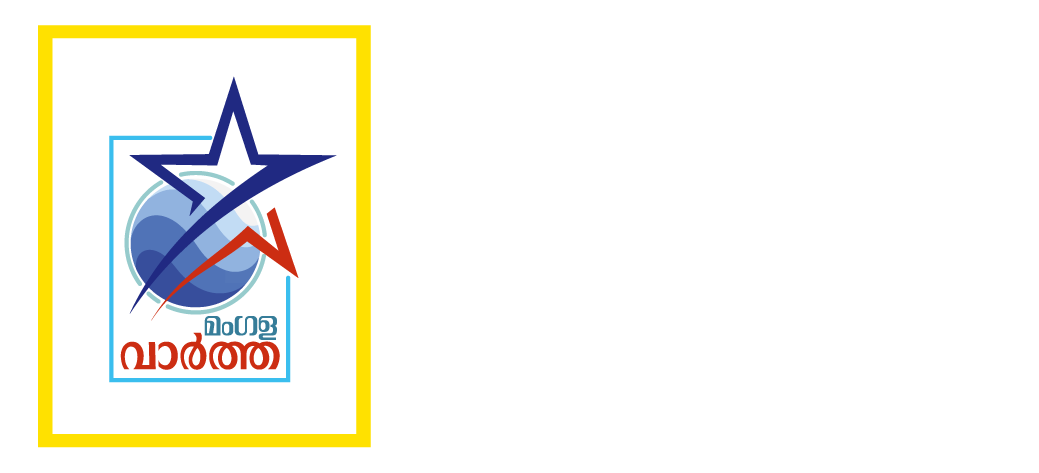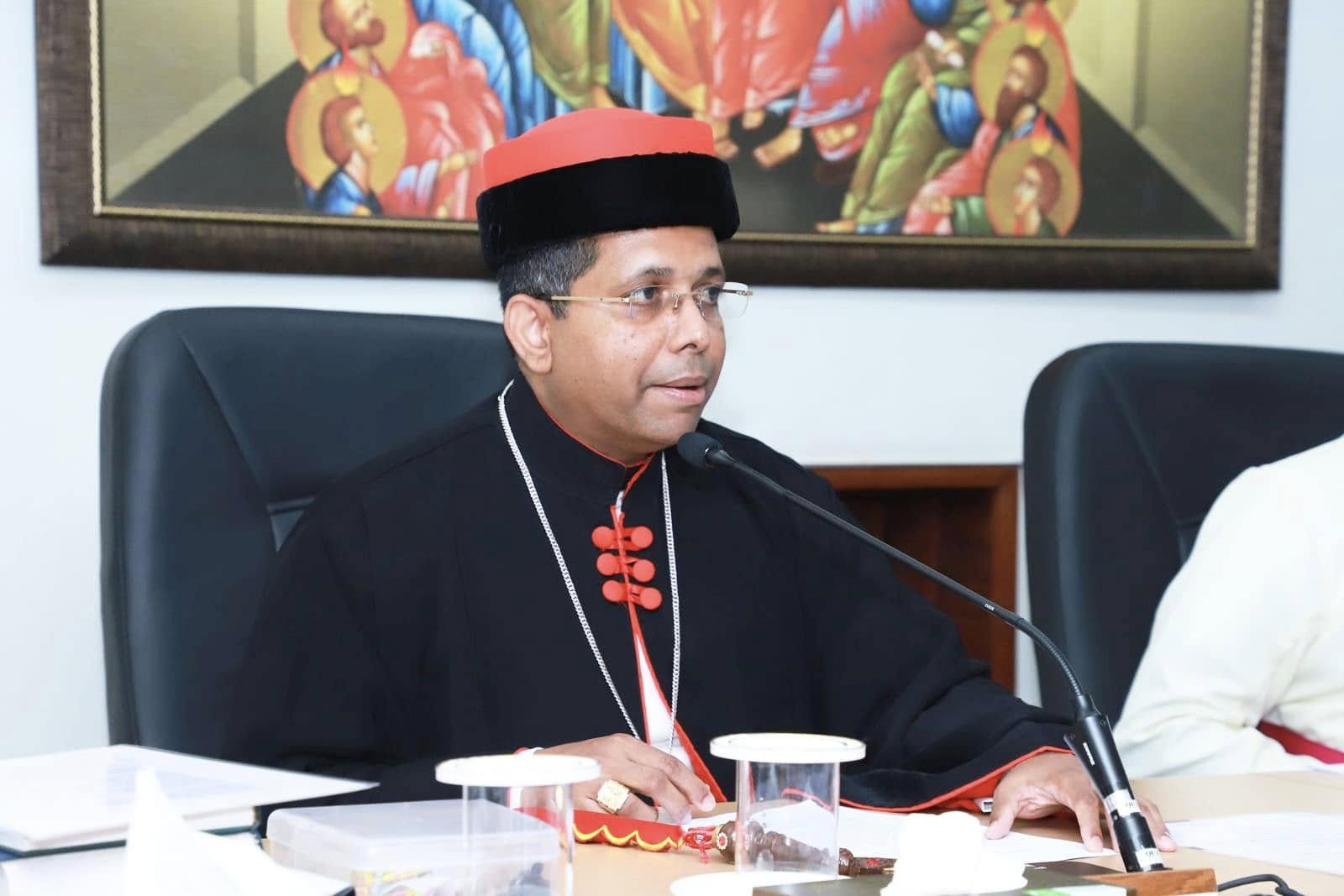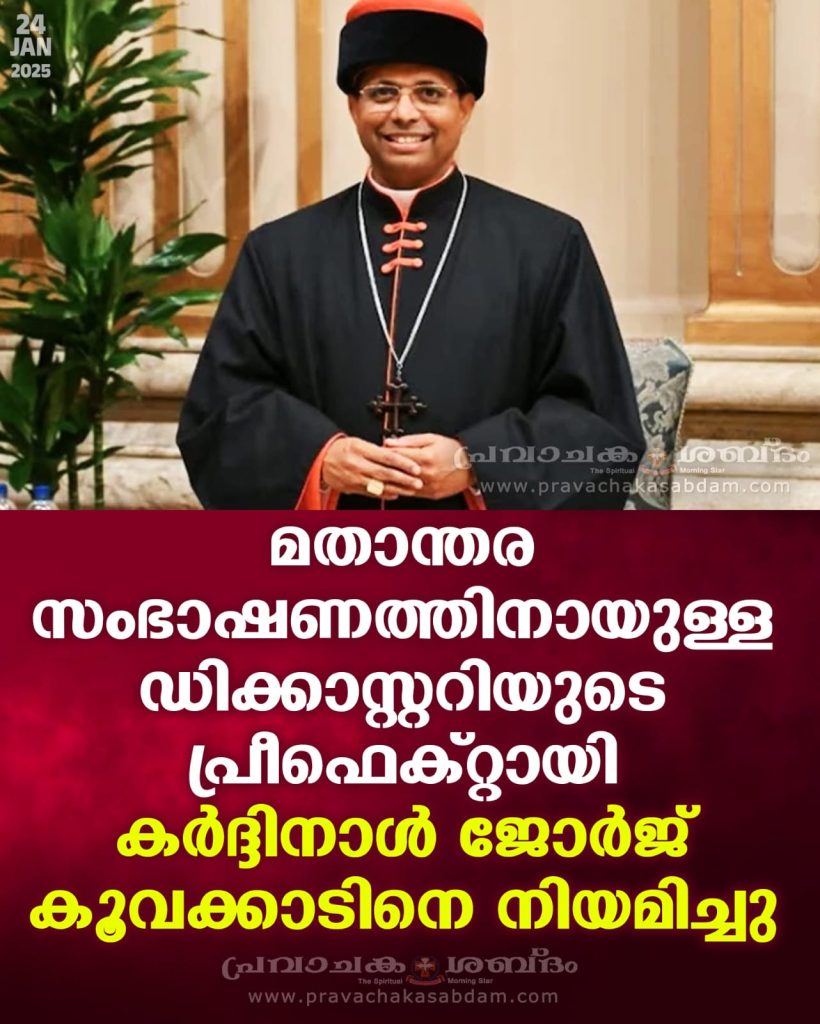
വിവിധ മതങ്ങൾക്കിടയിൽ സൗഹാർദ്ദം ഊട്ടിയുറപ്പിക്കുന്നതിനും, സമാധാനത്തിനായുള്ള സംഭാഷണങ്ങൾ ത്വരിതപ്പെടുത്തുന്നതിനും പ്രവർത്തിക്കുന്ന വത്തിക്കാനിലെ ഡിക്കസ്റ്ററിയുടെ പുതിയ പ്രീഫെക്റ്റായി കർദിനാൾ ജോർജ് കൂവക്കാടിനെ ഫ്രാൻസിസ് പാപ്പാ നിയമിച്ചു. അതേസമയം പാപ്പായുടെ വിദേശയാത്രയുടെ ചുമതലകളും അദ്ദേഹം തുടർന്ന് വഹിക്കും
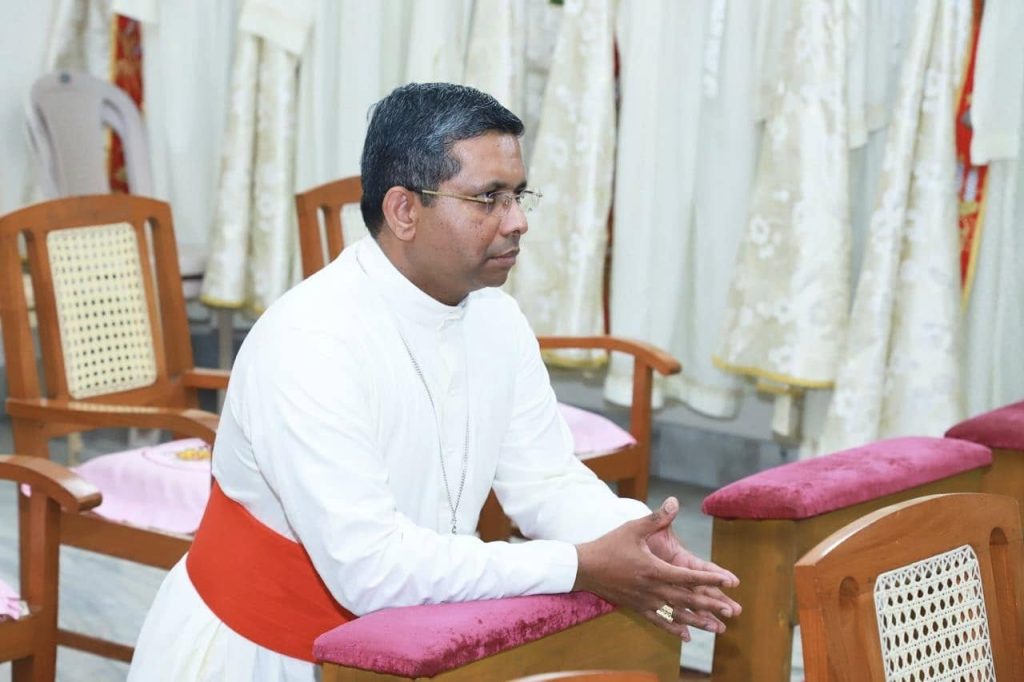
വൈദികനായിരിക്കെ, ഫ്രാൻസിസ് പാപ്പാ കർദിനാൾ പദവിയിലേക്ക് ഉയർത്തിയ ഭാരതീയനായ കർദിനാൾ ജോർജ് കൂവക്കാട് വത്തിക്കാനിലെ മതസൗഹാർദ്ദ ഡിക്കസ്റ്ററിയുടെ പ്രീഫെക്റ്റായി നിയമിക്കപ്പെട്ടു. ജനുവരി മാസം ഇരുപത്തിനാലാം തീയതിയാണ്, ഫ്രാൻസിസ് പാപ്പാ, ഈ പുതിയ നിയോഗത്തിനു കർദിനാളിനെ ചുമതലപ്പെടുത്തിയത്. അതേസമയം, പാപ്പയുടെ വിദേശയാത്രകൾ സംഘടിപ്പിക്കുന്ന തന്റെ ഉത്തരവാദിത്വങ്ങളും അദ്ദേഹം തുടരും.
പരിശുദ്ധ പിതാവിന്റെ മാർഗനിർദേശത്തിലും, തനിക്കു മുമ്പുള്ളവർ അഗാധമായ ജ്ഞാനത്തോടെ ഇതിനകം കണ്ടെത്തിയ മതസൗഹാർദ്ദ പാതയിലും ആശ്രയിച്ചുകൊണ്ട്, എല്ലാവരുടെയും പ്രാർത്ഥനകളുടെ പിന്തുണയോടെ താൻ ഈ ഉത്തരവാദിത്വം ഏറ്റെടുക്കുന്നുവെന്നു കർദിനാൾ പ്രതികരിച്ചു. തന്റെ അപര്യാപ്തതകൾക്കിടയിലും, മതങ്ങൾക്കിടയിലുള്ള ഒരു സൗഹൃദം സ്വപ്നം കാണുന്ന, ജനതകൾക്കിടയിൽ സമാധാനത്തോടെയുള്ള സഹവർത്തിത്വം ആഗ്രഹിക്കുന്ന ആളുകളുടെ പ്രാർത്ഥനകളും, ഡിക്കസ്റ്ററിയിൽ തന്റെ സഹപ്രവർത്തകരുടെ സഹകരണവും തന്നെ ശക്തിപ്പെടുത്തുന്നുവെന്നും കർദിനാൾ പങ്കുവച്ചു.
എല്ലാ മതങ്ങളെയും ബഹുമാനിക്കുകയും ഐക്യം ഉറപ്പാക്കുകയും ചെയ്യുന്ന ഒരു ബഹുസാംസ്കാരികവും ബഹുമതപരവുമായ സമൂഹത്തിലാണ് താൻ ജനിച്ചത്, അതിനാൽ മതാന്തര സംവാദങ്ങൾ ഇന്ത്യൻ ആത്മീയതയുടെ ഭാഗമാണെന്നും കർദിനാൾ തന്റെ ജീവിതം അടിവരയിട്ടുകൊണ്ട് പറഞ്ഞു. അതിനാൽ മതിലുകളല്ല, പാലങ്ങളാണ് ക്രിസ്ത്യാനികൾ പണിയേണ്ടതും പ്രോത്സാഹിപ്പിക്കേണ്ടതെന്നും അദ്ദേഹം കൂട്ടിച്ചേർത്തു. മതാന്തര സംഭാഷണം കേവലം മതങ്ങൾ തമ്മിലുള്ള സംഭാഷണമല്ല, മറിച്ച് ദൈവവിശ്വാസത്തിന്റെ സൗന്ദര്യത്തിനു സാക്ഷ്യം വഹിക്കുന്നതാണെന്നും കർദിനാൾ ചൂണ്ടിക്കാണിച്ചു. ഇസ്ലാം മത വിശ്വാസികളുമായുള്ള സംഭാഷണത്തിനും ഏറെ ഊന്നൽ നൽകുമെന്നും അദ്ദേഹം പറഞ്ഞു.
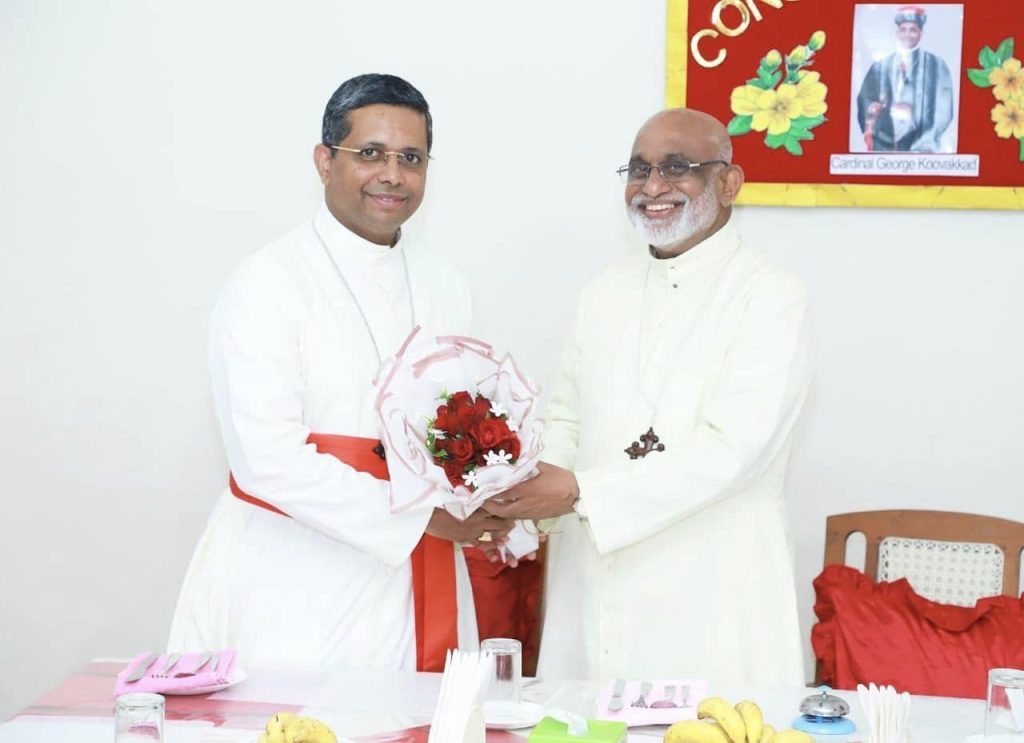
പരിശുദ്ധ പിതാവുമായി നടത്തിയ വിദേശ യാത്രകൾ, പ്രത്യേകിച്ചും മറ്റു മതങ്ങൾ ഭൂരിപഷം വരുന്ന രാജ്യങ്ങളിൽ, താൻ അനുഭവിച്ച മതസൗഹാർദ്ദ കൂട്ടായ്മകളും, സംഭാഷണങ്ങളും തന്റെ ഈ പുതിയ ദൗത്യനിർവഹണത്തിനു ഏറെ സഹായകരമാകുമെന്നും കർദിനാൾ പങ്കുവച്ചു. ഇറാഖിലേക്കുള്ള ചരിത്രപരമായ സന്ദർശന വേളയിൽ നജാഫിലെ ഗ്രാൻഡ് ആയത്തുല്ല സയ്യിദ് അലി അൽ-സിസ്താനിയുമായി പരിശുദ്ധ പിതാവ് നടത്തിയ സംഭാഷണത്തിന്റെ പ്രാധാന്യം തന്റെ ജീവിതത്തിൽ ഏറെ പ്രചോദനമായെന്നതും കർദിനാൾ കൂവക്കാട് അടിവരയിട്ടു പറഞ്ഞു.
Cardinal Koovakad: Interreligious dialogue can build peace

As Pope Francis appoints Cardinal George Koovakad as Prefect of the Dicastery for Interreligious Dialogue, the Indian-born Cardinal speaks to Vatican News about his new role and his continuing mission to organize the Pope’s Apostolic Journeys.
By Andrea Tornielli
“I feel wonder, joy, and great trepidation for the immense responsibility of succeeding a wise and kind man like Cardinal Ayuso, and a man of profound faith and tireless peacebuilder like Cardinal Tauran.”
These were the sentiments expressed by Indian-born Cardinal George Jacob Koovakad, organizer of the Pope’s Apostolic Visits, upon receiving news of Pope Francis’s decision on Friday to appoint him as Prefect of the Dicastery for Interreligious Dialogue.
The Dicastery fosters relations with members and groups of religions not under the Christian name, except Judaism, which falls under the Dicastery for Promoting Christian Unity.
The Holy See Press Office announced his appointment as Prefect on Friday, January 24, adding that Cardinal Koovakad will retain his current role as organizer of papal visits.
In the following interview, Cardinal Koovakad spoke about his first impressions and the examples of the Popes in fostering interreligious dialogue.
Q: How did you receive this appointment?
Cardinal Koovakad: With immense gratitude to Pope Francis, who, in less than two months, unexpectedly included me in the College of Cardinals, appointed me Archbishop, and now entrusts me with a Dicastery that was recently led by a wise and good man like Cardinal Miguel Ángel Ayuso Guixot, and before him, a man of profound faith and tireless peacebuilder like Cardinal Tauran, right up to the end of his life.
I confess, the thought fills me with great trepidation and a sense of inadequacy. At the same time, I rely heavily on the prayers of all those who continue to dream of a world where religious differences not only coexist peacefully but become essential elements in building peace among peoples.
I trust in the guidance of the Holy Father and in the path already wisely traced by those who preceded me. Above all, I rely on the help of the Dicastery’s collaborators, whom I have met in the past few hours and who have already welcomed me with friendship and made me feel at home.
Q: You were born 51 years ago in Chethipuzha, Kerala. As an Indian, even though you have spent many years away from your country, do you feel that interfaith coexistence is deeply ingrained in your identity?
Yes, I was born and raised in a multicultural and multi-religious society where all religions are respected and harmony is preserved. Diversity is a richness!
I like to emphasize that interreligious dialogue in India is traditionally linked to monasticism. As early as 1500, Jesuit Fr. Roberto De Nobili adopted the clothing and customs of Indian monks, learned local languages, and sought to assimilate whatever could be valued in these traditions. Such attempts are not without risks, though, as the Pope teaches us, stepping out and moving forward always carries risks.
But what I want to highlight is this attitude of openness, sympathy, and closeness to other traditions. Christian faith is capable of inculturation: Christians are called to be seeds of fraternity for all. This does not mean giving up one’s identity but rather being aware that identity should never be a reason to build walls or discriminate against others. Instead, it should always be an opportunity to build bridges.
Interreligious dialogue is not simply a dialogue between religions but between believers called to bear witness to the beauty of believing in God and practicing fraternal charity and respect.
Q: One of your Dicastery’s responsibilities is the relationship with the Islamic world. What can you tell us about this?
The Second Vatican Council marked the beginning of a new era in relations with other religions, including Islam. I recall prophetic words and gestures, such as those of St. Paul VI, who, as a pilgrim in Uganda in 1969, honored the first African Christian martyrs by drawing a parallel that included Muslim believers in the martyrdom they all suffered under local tribal kings.
Then there are the words of St. John Paul II to Muslim youth in Casablanca, Morocco, in 1985, when he said, “We believe in the same God, the one God, the living God, the God who creates worlds and brings His creatures to perfection.” Sixteen years later, the same Pope entered a mosque for the first time, crossing the threshold of the Umayyad Mosque in Damascus during his visit to Syria.
The memory of Pope Benedict XVI praying silently in the Blue Mosque of Istanbul in 2006 remains vivid. And how can we not mention the many steps taken by Pope Francis, such as the signing of the Document on Human Fraternity with the Grand Imam of Al-Azhar, Ahmad Al-Tayyeb, on February 4, 2019, in Abu Dhabi, followed a year later by the encyclical Fratelli tutti.
Q: The events you mention are almost all tied to papal Apostolic Journeys, which leads me to connect this to your role in organizing Pope Francis’s visits.
Indeed, it is true: the Holy Father’s journeys almost always have interreligious dimensions, encounters with authorities of other faiths, and moments of lived fraternity. I think of the recent visit to Asia and Oceania last September when Pope Francis blessed the “Friendship Tunnel” connecting the mosque and the cathedral in Jakarta, Indonesia. I was moved by the gestures of friendship from the Grand Imam Nasaruddin Umar.
Together with the Apostolic Nunciature and collaborators from the Secretariat of State’s Journeys Office—whom I thank for their work—we had prepared extensively, in dialogue with Muslim authorities, for the visit to Dubai planned for early December 2023 for COP28 on climate change, which was canceled just days before departure due to the Pope’s convalescence.
I would also like to mention the beautiful experience a few months earlier in Mongolia, where only 1.3% of the population is Christian, as well as the Apostolic Visits to Kazakhstan and Bahrain. The context of the Dicastery for Interreligious Dialogue is entirely new to me, but I believe the experience I have gained and will continue to gain in the Journeys Office has been and will remain valuable.
Likewise, I hope my service in Apostolic Nunciatures in Algeria, South Korea, and Iran will be helpful. I still vividly remember the images of the Pope’s dialogue with Grand Ayatollah Sayyid Ali al-Sistani in Najaf during his historic visit to Iraq in 2021, even though at that time, I was not yet involved in papal visits.


